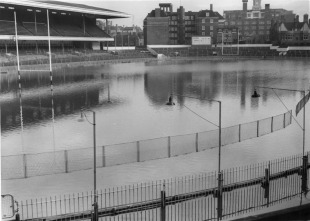|
1960
Boks battered by the elements
Huw Richards
December 3, 2010

Cardiff Arms Park was left completely flooded after two more days of heavy rain following Wales' clash with South Africa
© Getty Images
Enlarge
Whatever the Springboks were expecting from their visit to Britain and Ireland, it is unlikely that they anticipated this week's extraordinary weather. They are not, though, the first Boks to be confronted by the British climate at its most virulent. Fifty years ago today, on December 3, 1960, Avril Malan's team played Wales at Cardiff Arms Park. The construction of the Arms Park on the flood plain of the River Taff was perfectly logical, in one sense. It is naturally, beautifully flat. But it isn't called a flood plain for nothing. Every so often the Taff would attempt to reclaim the land. The first week in December 1960, as the rain teemed down on Cardiff, was one of those times. The result was conditions that journalist John Billot, writing in 1974 with a lifetime's experience of Arms Park mudbaths, reckoned 'the worst ever'. The rain itself was bad enough, but it was compounded by 50 mph winds blowing straight down the pitch. Wales, taking their fifth run at the Boks since 1906, had a much-changed team led by classy fullback Terry Davies. They had Bryn Meredith, a veteran of the 1955 British Lions tour of South Africa, at hooker and Pontypool's Ray Prosser, first capped in 1956 and later the inspiration for his club's greatest era, in the front row. But the third man at the heart of the Welsh scrimmage, Cardiff prop Kingsley Jones, was more typical of a team that included six new caps. Among them were half-backs Tony O'Connor and Ken Richards and two men destined for different kinds of national service - Llanelli wing Dennis Evans, who was winning his only cap, would more than 30 years later become secretary of the Welsh Rugby Union while Ebbw Vale flanker David Nash had much less time than to wait before becoming the first national coach. The Boks had not lost a Test in Britain since 1906. They were a remorselessly tough side, well fitted to their times. Only 36 points were scored in the five Test matches during the tour. While their approach to the game was criticised for physicality and conservatism, these were not in any case freeflowing times - Five Nations matches this season would average only just over 12 points apiece. And you certainly could not deny that a style based around a dominant pack was ideal for this day. There were times when Malan was happy to let Wales win line-out ball, reckoning it one of those days when the risk of making mistakes when in possession far outweighed any attacking possibilities. The afternoon's fateful moment probably came before kick-off. Davies won the toss and opted to play into the wind. He admitted afterwards 'we gambled on the toss' and was fiercely criticised for it, but Malan later admitted that he would have done the same himself. It was far from clear at half-time, when South Africa led by only 3-0, a penalty goal kicked by outside-half Keith Oxlee, that Davies had been mistaken.
Wales had 40 minutes to play with the wind and only a single score to make up. They had, though, the after-effects of the 40 minutes they had played into the elements and opponents who were dominating the scrummage, eventually taking 29 strikes to nine, and were perfectly adapted to the conditions. The authors of Fields of Praise have recalled that South African No.8 Doug Hopwood 'took on the whole Welsh pack by himself". Veteran South African reporter A.C.Parker recorded Hopwood picking up from scrums and making yards with ball in hand as the Boks confined play to a narrow patch of ground inside the Welsh half. Wales had their moments, with lock Danny Harris crossing the line but being ruled not to have scored and Ken Richards just missing with a drop goal. As conditions worsened Scottish referee Jack Taylor offered both captains the chance to abandon the game, but they chose to go on. Billot remembered the crowd watching with 'a mixture of wet misery and hope. In the end it was just misery'. This was the first international of the tour. The Boks were to go on to their fourth consecutive touring Grand Slam, with only Scotland crossing their line, before drawing 0-0 with France and losing their unbeaten record in the tour finale against the Barbarians, a 6-0 loss remembered more for Swansea fullback Haydn Mainwaring's concussive shoulder charge on the bull-like Malan than for any of the scoring action. Their unbeaten run in Tests in Britain and Ireland was to last until 1965, while Wales had to wait until 1999 to beat them. The nearest Wales were to get before then was in 1970, in yet another Cardiff mudbath, when Gareth Edwards scored an equalising try in the last minute but left a conversion that would have been exceptionally difficult under the best kicking conditions, never mind those where simply getting the ball off the ground was an achievement. Three-nil and a wrestling match between mud-encrusted men in gale-force winds. They don't make international matches like that anymore, and maybe it is just as well. © ESPN Sports Media Ltd.
| |||||||||||||||
Live Sports
Communication error please reload the page.
-
Football
-
Cricket
-
Rugby
-
- Days
- Hrs
- Mins
- Secs
F1 - Abu Dhabi GP
Abu Dhabi Grand Prix December 11-131. Max Verstappen ()
2. Valtteri Bottas (Mercedes)
3. Lewis Hamilton (Mercedes)
4. Alexander Albon ()
5. Lando Norris ()
6. Carlos Sainz Jr ()
-
ESPNOtherLive >>
Golf - Houston Open
Snooker - China Open
Tennis - Miami Open

